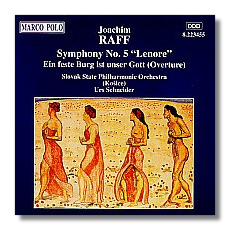
The Internet's Premier Classical Music Source
Related Links
- Raff Reviews
- Latest Reviews
- More Reviews
-
By Composer
-
Collections
DVD & Blu-ray
Books
Concert Reviews
Articles/Interviews
Software
Audio
Search Amazon
Recommended Links
Site News
 CD Review
CD Review
Joachim Raff

Symphony #5
- Symphony #5 "Leonore" Op. 177 (1872)
- "Eine feste Burg ist unser Gott" Op. 127 (1865)
Slovak State Philharmonic (Košice)/Urs Schneider
Marco Polo 8.223455 1993 DDD 70:30
It was film composer/conductor Bernard Herrmann who in the 1950's - 70's championed the cause of forgotten Romantic composers. One such composer was Joachim Raff, and Herrmann in fact made a great recording of Raff's "Leonore" Symphony for Nonesuch records back in 1970 with the London Philharmonic. Today, the Marco Polo CD label is championing the music of forgotten masters, and so it is perhaps natural to expect a recording of the symphonies of Raff to appear. For this release, Marco Polo has duplicated Herrmann's program, plus added as a bonus the overture based on Martin Luther's hymn "A Mighty Fortress is our God", which makes for a very full CD of music by Raff.
Born in 1822, Raff lived to compose eleven symphonies, along with a great body of piano pieces, chamber works, songs and even opera. He achieved some fame during his own lifetime, and lived in Hamburg, Vienna, Weimar and finally Frankfurt, where he died in 1882. He tended to compose programmatic symphonies, based upon literary works. Such is the case with the Symphony #5, which is a musical portrayal of Gottfried August Burger's "Leonore", the tale of a woman whose beloved goes off to war and is killed. In Raff's music, the movements of the symphony correspond to particular themes of the story: "Love's Bliss", "Separation", and "Reunion in Death".
The first movement depicts Lenore's beloved Wilhelm, who is a soldier. Raff's musical portrait of him emphasizes assertiveness, manliness and confidence. In fact, rarely does a symphony begin with such an easy and infectious exuberance! The second movement fleshes out the love that Lenore has for him, and includes their impassioned (yet tasteful) "love duet" as a touching interplay of the violin and cello sections. The third movement is a spunky and energetic march (conductor Herrmann could have composed this himself!) whose tune will remain with you long after you first hear it. The musical focus is back to Wilhelm, as he prepares to march off to battle. In the finale, Lenore's grief is laid bare, as she realizes that her lover will not be returning. She is beckoned by a spirit to embark on a ghostly night ride on horseback, and Raff's musical portrayal is excellent in this section also. By the work's conclusion, we get the feeling that the two lovers are back in each other's arms, if only in death. The final music is a beautiful hymn, somewhat reminiscent of the close to Tchaikovsky's Manfred Symphony.
The performance of Raff's Fifth on this new Marco Polo disc is different enough from Herrmann's (now available on Unicorn CD, number 2031) to warrant owning both recordings. Conductor Urs Schneider and his orchestra, while not attempting to play (some would say overplay) the music as forcefully as Herrmann and the LPO, do achieve a sensitive and attractively projected reading that benefits from smoother and more balanced recorded sound, and a logical control of the different programmatic aspects of the score. The Slovak orchestra is note-perfect, sonorous and responsive to the demands of the music. Dynamic contrasts are quite effective, with lighter, more gentle and cleaner orchestral textures than in the Herrmann disc (though I also admit to being fond of Herrmann's cinematic style, the prominent brass and drums particularly).
In sum, this is a release which should please anyone who collects orchestral recordings of the Romantic era. If you like the orchestral works of Mendelssohn, Liszt, or Dvořák, you will be happy to meet Raff. There is a hint of Smetana (Ma Vlast) in the Raff "Eine feste Burg" and, curiously, of Rachmaninoff (Vocalise) in the symphony's love music. (P.S.: anyone familiar with Herrmann's score to "Mysterious Island" may well ponder the influence of Raff's music: listen to the vigorous trombones and strings approximately ten minutes into Raff's finale and compare to Herrmann's balloon sequence in the film!).
Again, Marco Polo's recording quality and notes are excellent. I can't help but wonder whether the other ten symphonies and perhaps some of the chamber music will be recorded. Let's hope so, because Raff knew what he was about.
Copyright © 1996, Peter S. Murano


















